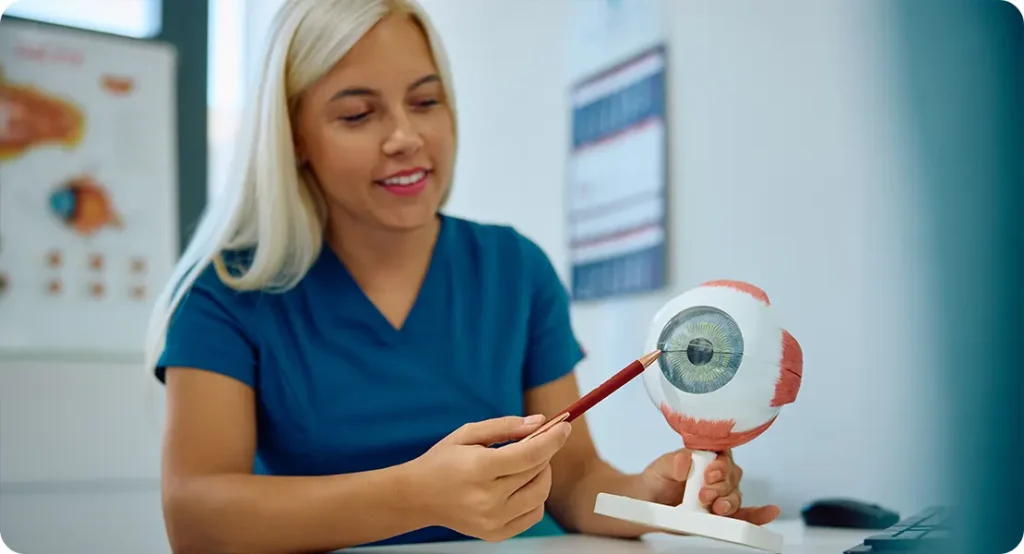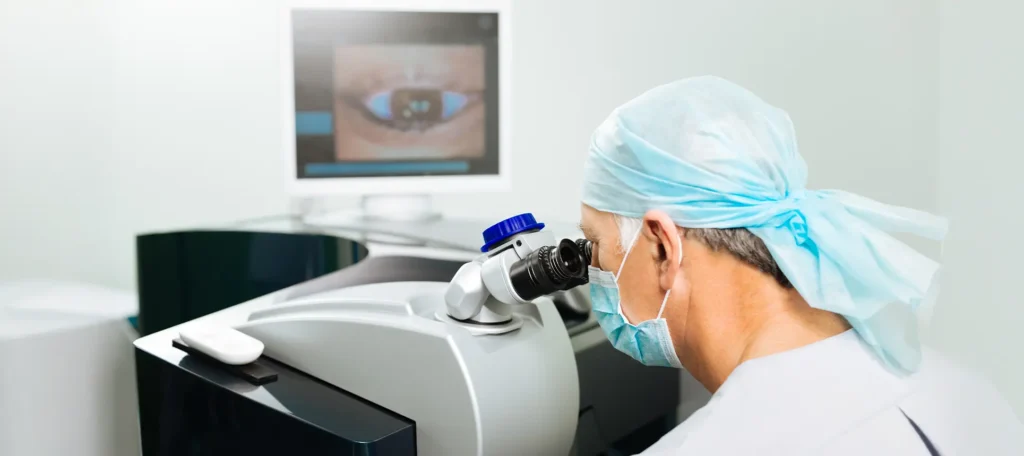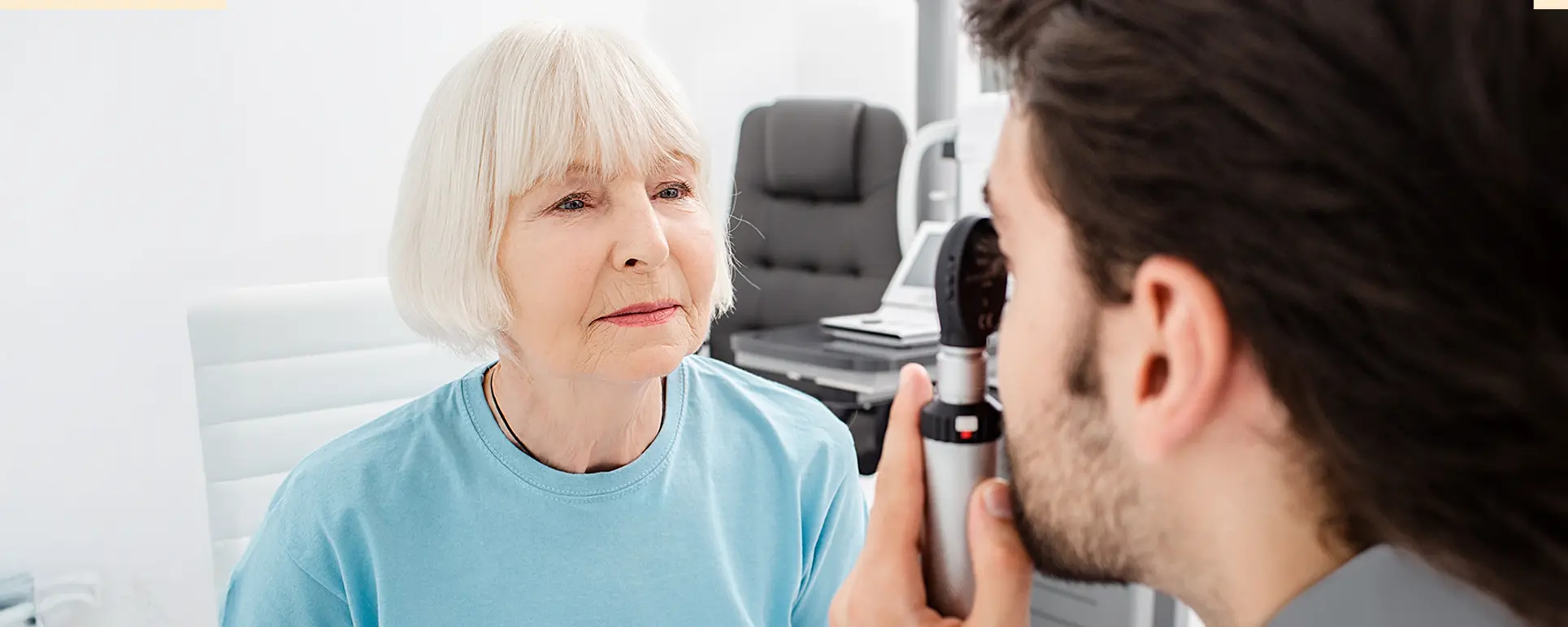If you’re living with coeliac disease and facing the prospect of cataract surgery, you might be wondering if your condition could complicate things. The short answer is: yes, it can, but it doesn’t have to. With the right planning and support, most people with coeliac disease have very successful outcomes after cataract surgery.
Coeliac disease is an autoimmune condition that affects your gut’s ability to absorb nutrients, particularly when you’re exposed to gluten. But its impact doesn’t stop there — malabsorption can affect your bones, your skin, your energy levels, and importantly in this case, your eyes. If your nutrient levels are low or if inflammation is ongoing, it could affect how your eyes heal after surgery.
So, in this article, we’re going to walk through what you should expect, what you can do to prepare, and how to make sure your coeliac disease doesn’t throw a spanner in the works when it comes to cataract surgery.
Understanding Coeliac Disease’s Impact on Eye Health
Let’s start with the basics: how can a gut condition like coeliac disease influence your eyes? It turns out, the link is largely down to nutrient absorption and immune activity.
First, people with coeliac disease often struggle to absorb key vitamins and minerals, especially before diagnosis or if the gluten-free diet isn’t being strictly followed. Vitamins A, D, E, and B12, along with zinc and iron, are among the most common deficiencies. Each of these plays a role in eye health. For example:
- Vitamin A is essential for night vision and corneal health.
- Zinc helps vitamin A function properly and is vital for maintaining the structure of eye tissues.
- Vitamin E and C both support antioxidant protection in the lens — which is especially important when we’re talking about cataracts.
Secondly, coeliac disease is driven by immune dysregulation. That means even if you’re not experiencing obvious symptoms, your body may be in a low-grade inflammatory state, which can affect healing and increase your risk of postoperative complications — albeit slightly.
Cataracts and Coeliac Disease: Is There a Direct Link?
While coeliac disease doesn’t directly cause cataracts, some research suggests that people with autoimmune conditions may develop cataracts earlier or be more prone to certain types. One reason is long-term inflammation; another is the medications sometimes used to control autoimmune flare-ups — including steroids, which are known to increase cataract risk.
Moreover, nutritional deficits from untreated or poorly managed coeliac disease may leave the lens more vulnerable to oxidative damage, hastening cataract development. For example, low levels of antioxidants such as lutein and zeaxanthin can make the lens less resilient over time.
It’s also worth noting that people with coeliac disease might have coexisting autoimmune conditions such as type 1 diabetes or thyroid disease, which can also increase cataract risk or complicate surgery.
Pre-Surgery Preparation: What You Should Do if You Have Coeliac Disease

Preparing for cataract surgery is always important, but when you have coeliac disease, there are a few extra steps worth taking.
1. Get Your Nutritional Status Checked
Ask your GP or gastroenterologist to check your current vitamin and mineral levels — particularly B12, iron, vitamin D, and zinc. These nutrients all support wound healing and tissue recovery. If you’re found to be deficient in anything, supplements (or in some cases, injections) may be recommended before surgery to boost your levels.
Also, keep in mind that some supplements, especially multivitamins, may contain gluten as a filler. Look for gluten-free certification to be safe.
2. Confirm You’re Strictly Gluten-Free
Even small lapses in a gluten-free diet can trigger gut damage and malabsorption. If your gut isn’t in good shape going into surgery, your ability to absorb medications or heal efficiently could be compromised. If you’ve been accidentally exposed to gluten recently, let your surgeon know — you may need to delay surgery slightly to allow your gut to recover.
3. Talk to Your Surgeon and Anaesthetist
Make sure both your ophthalmologist and the anaesthesia team are aware of your coeliac disease. While topical anaesthetic drops are typically used in cataract surgery, some people may need additional sedatives or antibiotics, and it’s important they’re free from gluten-derived ingredients (especially excipients or coatings in oral forms).
Most IV or injectable medications are safe, but oral tablets should be screened in advance — especially if you’re staying in a hospital overnight or receiving medication to take at home.
What Happens on the Day of Surgery?
On the day of cataract surgery, most people are in and out of the clinic within a couple of hours. The procedure itself is usually done under local anaesthetic using eye drops. You’ll be awake, but you won’t feel pain — only some pressure and light.
If you have coeliac disease, the actual surgical process isn’t significantly different. But again, flag your condition when checking in, and remind the nursing team if you’re being given anything by mouth — even if it’s just paracetamol or an anti-nausea tablet.
Also, if you’re receiving a snack or drink after surgery, check that it’s gluten-free. Some recovery lounges provide tea and biscuits or sandwiches — and they may not all be coeliac-friendly by default.
Recovery After Cataract Surgery: Special Considerations for Coeliac Disease

Most people bounce back from cataract surgery within a week or two. But your healing time can be influenced by your overall health — and this is where coeliac disease might play a small role.
1. Healing May Be Slightly Slower
If your nutritional stores are depleted, your tissues may not regenerate quite as quickly. This can translate to prolonged dryness, slight inflammation, or a longer time before your vision fully sharpens. That said, most people still heal within the normal range — it just may take a few extra days if your body is already under strain.
2. Watch for Signs of Inflammation
Your immune system, already on high alert due to coeliac disease, may respond to surgery with slightly more inflammation than usual. This isn’t always noticeable, but in some cases, it can lead to a condition called iritis or uveitis (inflammation inside the eye), especially if you have another autoimmune condition.
You’ll usually be given steroid or non-steroidal anti-inflammatory drops to use after surgery. Use them exactly as prescribed, and don’t stop early, even if your eye feels fine. If you notice increasing pain, redness, or blurred vision, contact your clinic right away.
3. Maintain a Nutrient-Dense Diet During Recovery
During healing, your body needs plenty of protein, vitamins, and antioxidants. Focus on:
- Leafy greens and colourful veg (for vitamin C, lutein, and beta-carotene)
- Gluten-free whole grains (like quinoa, brown rice, and oats labelled GF)
- Lean protein (chicken, fish, lentils, tofu)
- Healthy fats (olive oil, avocado, nuts — if tolerated)
If your appetite is low after surgery or you feel fatigued, consider a gluten-free nutritional shake as a temporary boost.
Managing Medication Risks: Gluten-Free Compliance and Coeliac Safety
While most eye drops are gluten-free and safe for those with coeliac disease, you should still double-check any oral medication prescribed after your surgery.
Ask your pharmacist or eye doctor to confirm the gluten-free status of:
- Antibiotic eye drops
- Anti-inflammatory tablets (e.g. ibuprofen, if recommended)
- Any oral painkillers
- Sedatives (if prescribed)
You can also request a patient information leaflet in advance to confirm ingredients. If in doubt, Coeliac UK offers a medicine-checking service for its members.
When to Seek Help: Red Flags You Shouldn’t Ignore
You’re the best judge of how you’re feeling. If you have coeliac disease and you notice anything unusual during your cataract surgery recovery, don’t hesitate to get help. This includes:
- Eye pain or worsening vision after 48 hours
- Signs of infection like pus, swelling, or fever
- Digestive symptoms that flare up post-surgery, possibly from gluten exposure via medication or food
- Difficulty sleeping or increased anxiety from medication interactions
Most of the time, these issues are preventable with good communication and planning. But if something feels off, trust your instincts and contact your clinic or GP.
Long-Term Outlook: Will Cataract Surgery Outcomes Be Different?

In general, the long-term results of cataract surgery are just as good for people with coeliac disease as for anyone else — as long as the condition is well-managed. Your new lens implant won’t be affected by your gut health, and once healing is complete, you should enjoy clearer vision just like other patients.
However, staying gluten-free, taking any necessary supplements, and keeping inflammation under control will give your eyes (and the rest of your body) the best shot at long-term success.
FAQs: Cataract Surgery and Coeliac Disease
- Can coeliac disease increase my risk of complications after cataract surgery?
Yes, coeliac disease can slightly raise the risk of complications after cataract surgery, especially if it’s poorly controlled or if you have vitamin deficiencies. Your immune system may be more reactive, and healing could take longer if your body lacks key nutrients like zinc or vitamin A. However, with good gluten-free adherence and nutritional support, most people recover without issue. - Should I delay cataract surgery if my coeliac symptoms are flaring up?
It’s generally advisable to wait until your symptoms settle before having cataract surgery, as a flare-up often means active gut inflammation and poor nutrient absorption. Going into surgery while your body is under stress could make recovery slower and increase your sensitivity to medications. Stabilising your condition first gives you a better chance of healing smoothly. - Do eye drops contain gluten?
Most eye drops used in cataract surgery are gluten-free and don’t pose a risk to people with coeliac disease, since they aren’t ingested. That said, it’s still wise to double-check with your pharmacist or surgical team, particularly if you’re given any drops in combination with tablets, where gluten-based fillers might occasionally be present in oral forms. - Can vitamin deficiencies from coeliac disease affect my vision?
Yes, long-standing coeliac disease can lead to deficiencies in vitamins and minerals that support eye health, such as vitamin A, B12, D, E, and zinc. These nutrients are important for maintaining clear vision and supporting healing. If they’re too low, you might experience delayed recovery or ongoing eye discomfort after cataract surgery unless corrected in advance. - Is there a link between coeliac disease and cataracts?
While coeliac disease doesn’t directly cause cataracts, the condition can contribute indirectly by leading to nutritional deficiencies and chronic inflammation. Some people with coeliac disease may also take steroids for co-existing autoimmune problems, which is a known risk factor for cataracts. So, while the link isn’t direct, there is an underlying connection worth being aware of. - What should I tell my surgeon about my coeliac disease?
You should inform your surgeon and care team that you have coeliac disease and let them know whether it’s well controlled. It’s also important to tell them about any recent flare-ups or ongoing symptoms, and to ask that all oral medications or post-operative snacks be gluten-free. Clear communication helps your team personalise your care and avoid unnecessary risks. - Do I need special post-surgery food if I’m coeliac?
After surgery, stick to your regular gluten-free diet, but try to focus on foods rich in nutrients that promote healing, like lean protein, leafy greens, and healthy fats. You don’t need a separate post-op diet, but avoiding processed or low-nutrient gluten-free foods can help your body recover faster. A gluten-free multivitamin may also be useful if advised by your doctor. - Can medications given after surgery contain gluten?
Some oral medications, especially cheaper generic tablets, may contain gluten-based fillers, though this is becoming less common. Always ask your pharmacist to confirm that your prescribed medications are gluten-free, particularly antibiotics or painkillers. If there’s any doubt, you can request alternatives or check with Coeliac UK for a definitive list of safe options. - What signs should I watch out for during recovery?
During recovery, be alert for persistent eye redness, pain, or blurred vision beyond the first 48 hours, as these could signal inflammation or infection. Also watch for any digestive symptoms that suggest accidental gluten exposure, which might come from medications or hospital food. If anything seems off, contact your clinic or GP straight away to stay on the safe side. - Will my vision outcome be worse because I have coeliac disease?
Not if your coeliac disease is well-managed. People with stable coeliac disease generally enjoy the same excellent visual results from cataract surgery as everyone else. The key is making sure your body is in a good place to heal — with a healthy gut, stable vitamin levels, and no gluten exposure — so that nothing interferes with the outcome of the procedure.
Final Thoughts
Having coeliac disease shouldn’t stop you from having excellent cataract surgery results. But it does mean you’ll want to be a bit more thorough with your planning. Check your nutrient levels, avoid gluten in any medications or snacks, and let your care team know about your condition at every stage.
If you’re looking for a clinic experienced in managing more complex or medically sensitive cases, the team at London Cataract Centre can help guide you through the process with individualised care. From preoperative screening to postoperative follow-up, they’ll ensure your needs are fully accounted for — coeliac disease and all.
References
- dos Santos Martins, T.G.S., Costa, A.L.F., Oyamada, M.K., Schor, P. & Sipahi, A.M., 2016. Ophthalmologic manifestations of celiac disease: a review. International Journal of Ophthalmology, 9(6), pp.939–943. Available at: https://www.ncbi.nlm.nih.gov/pmc/articles/PMC4768497/ [Accessed 2 July 2025].
- Beyond Celiac, 2024. Gluten in medications. BeyondCeliac.org. Available at: https://www.beyondceliac.org/living-with-celiac-disease/gluten-in-medication/ [Accessed 2 July 2025].
- PubMed, 2019. Ocular manifestations in celiac disease: an overview. PubMed. Available at: https://pubmed.ncbi.nlm.nih.gov/31916055/ [Accessed 2 July 2025].
- EyeWiki, 2023. Neuro‑Ophthalmic Manifestations of Celiac Disease. EyeWiki. Available at: https://eyewiki.org/Neuro-Ophthalmic_Manifestations_of_Celiac_Disease [Accessed 2 July 2025].
- Rinninella, E., Cintoni, M., Raoul, P., Triarico, S., Dionisi, T., Gasbarrini, G.B., Gasbarrini, A. & Mele, M.C., 2021. The Healthy Gluten‑Free Diet: Practical Tips to Prevent Metabolic Disorders and Nutritional Deficiencies in Celiac Patients. Gastroenterology Insights, 12(2), pp.166–182. Available at: https://doi.org/10.3390/gastroent12020015 [Accessed 2 July 2025].

